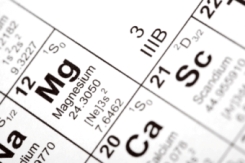How Much Magnesium Do You Need?
Asking how much magnesium should you be taking is a fairly obvious question for those who have been recommended supplementing with magnesium. Will too little mean that you won’t receive the benefits that you are looking for? And what happens if you take too much, will that potentially be harmful for your health (or will it just be an unnecessary expense)? Answering such questions is always a tricky proposition as there are a number of variables that will impact on the right daily dosage for you and the information presented in this article is a generalisation. As such, the “right” amount for you may vary and you should consult a health care professional if you require the information that is most pertinent to you.

Factors that may impact on how much magnesium you need may include:
Magnesium Requirements for Children
Typically figures quoted for magnesium for children are:Obviously these are guidelines and the reality is optimal magnesium dosage will incrementally increase with age. A child does not go to bed on the eve of their 8th birthday having consumed the ‘ideal’ 130mg on that day and then wake up on the morning of the 9th birthday needing to have 240mg that day in their diet. What should also be obvious is that children should be getting all of their magnesium via their food. If children are ever to take magnesium supplements then it should only be at the direction of a medical professional.
Magnesium Requirements for Women
The quoted recommended daily allowance (RDA) for women by the Office of Dietary Supplements does vary slightly with age and whether they are pregnant. For non-pregnant women between 19 and 30 years old then the RDA is 310mg. Over 31 then the RDA is marginally higher at 320mg.For women who are physically very active then there may be some benefits from having a higher daily magnesium intake. For example, there have been suggestions made that endurance athletes who sweat a lot may need to take in excess of twice the RDA although this would normally be after consultation with a dietician or other health care professional.
Pregnant women are recommended to have an extra 40mg per day.
As an aside then there have been research studies that indicate magnesium supplementation may help with some symptoms of PMS. Conservative levels of magnesium supplementation provided relief for around one third of women in a 2007 study (1). Another study looked at the impact of magnesium supplements and magnesium supplements combined with Vitamin B6 and found PMS symptoms statistically significantly improved with both groups with the greatest improvement observed when magnesium was taken in conjunction with the B6 vitamin.
Magnesium Requirements for Men
The RDA for men is slightly higher than women at between 400 and 420mg per day. However, active sports people, in particular endurance athletes may profit from higher levels and consulting a suitable professional is recommended.There has been some research that indicates that the magnesium supplements may increase levels of free and total testosterone. Although testosterone levels increased with magnesium supplementation in sedentary individuals there was a greater increase when the supplementation was combined with exercise. (3)
It goes without saying that in an ideal world that the magnesium we require should be available from our daily food intake. For suggestions regarding what are good sources of magnesium then please check out this article
(1) Pilot study of the efficacy and safety of a modified-release magnesium 250 mg tablet (Sincromag) for the treatment of premenstrual syndrome. Quaranta S1, Buscaglia MA, Meroni MG, Colombo E, Cella S. Clin Drug Investig. 2007;27(1):51-8.
(2) Evaluating the effect of magnesium and magnesium plus vitamin B6 supplement on the severity of premenstrual syndrome.
Fathizadeh N1, Ebrahimi E, Valiani M, Tavakoli N, Yar MH. Iran J Nurs Midwifery Res. 2010 Dec;15(Suppl 1):401-5.
(3) Effects of magnesium supplementation on testosterone levels of athletes and sedentary subjects at rest and after exhaustion.
Cinar V1, Polat Y, Baltaci AK, Mogulkoc R. Biol Trace Elem Res. 2011 Apr;140(1):18-23. doi: 10.1007/s12011-010-8676-3. Epub 2010 Mar 30.
